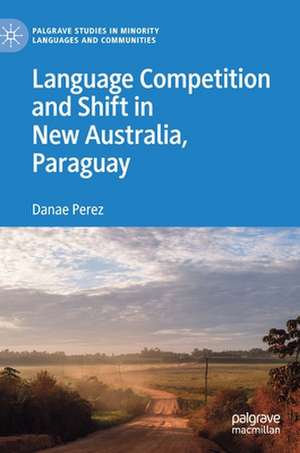Language Competition and Shift in New Australia, Paraguay: Palgrave Studies in Minority Languages and Communities
Autor Danae Perezen Limba Engleză Hardback – 6 noi 2019
| Toate formatele și edițiile | Preț | Express |
|---|---|---|
| Paperback (1) | 579.99 lei 43-57 zile | |
| Springer International Publishing – 6 noi 2020 | 579.99 lei 43-57 zile | |
| Hardback (1) | 589.14 lei 43-57 zile | |
| Springer International Publishing – 6 noi 2019 | 589.14 lei 43-57 zile |
Din seria Palgrave Studies in Minority Languages and Communities
- 20%
 Preț: 569.78 lei
Preț: 569.78 lei - 15%
 Preț: 639.25 lei
Preț: 639.25 lei - 18%
 Preț: 942.94 lei
Preț: 942.94 lei - 18%
 Preț: 942.63 lei
Preț: 942.63 lei - 15%
 Preț: 586.70 lei
Preț: 586.70 lei -
 Preț: 385.84 lei
Preț: 385.84 lei -
 Preț: 388.72 lei
Preț: 388.72 lei - 18%
 Preț: 787.91 lei
Preț: 787.91 lei -
 Preț: 392.60 lei
Preț: 392.60 lei - 15%
 Preț: 641.38 lei
Preț: 641.38 lei - 15%
 Preț: 639.90 lei
Preț: 639.90 lei - 18%
 Preț: 790.46 lei
Preț: 790.46 lei -
 Preț: 389.70 lei
Preț: 389.70 lei - 15%
 Preț: 640.88 lei
Preț: 640.88 lei - 15%
 Preț: 641.85 lei
Preț: 641.85 lei - 18%
 Preț: 946.24 lei
Preț: 946.24 lei - 15%
 Preț: 639.41 lei
Preț: 639.41 lei -
 Preț: 386.99 lei
Preț: 386.99 lei -
 Preț: 389.11 lei
Preț: 389.11 lei - 15%
 Preț: 647.40 lei
Preț: 647.40 lei -
 Preț: 390.63 lei
Preț: 390.63 lei -
 Preț: 392.60 lei
Preț: 392.60 lei -
 Preț: 380.45 lei
Preț: 380.45 lei - 15%
 Preț: 640.55 lei
Preț: 640.55 lei - 15%
 Preț: 644.63 lei
Preț: 644.63 lei -
 Preț: 389.11 lei
Preț: 389.11 lei - 15%
 Preț: 643.34 lei
Preț: 643.34 lei - 18%
 Preț: 1010.79 lei
Preț: 1010.79 lei -
 Preț: 390.63 lei
Preț: 390.63 lei - 18%
 Preț: 729.36 lei
Preț: 729.36 lei - 15%
 Preț: 645.79 lei
Preț: 645.79 lei
Preț: 589.14 lei
Preț vechi: 693.12 lei
-15% Nou
Puncte Express: 884
Preț estimativ în valută:
112.73€ • 118.02$ • 93.28£
112.73€ • 118.02$ • 93.28£
Carte tipărită la comandă
Livrare economică 07-21 aprilie
Preluare comenzi: 021 569.72.76
Specificații
ISBN-13: 9783030249885
ISBN-10: 3030249883
Pagini: 220
Ilustrații: XIII, 238 p. 4 illus., 3 illus. in color.
Dimensiuni: 148 x 210 mm
Greutate: 0.56 kg
Ediția:1st ed. 2019
Editura: Springer International Publishing
Colecția Palgrave Macmillan
Seria Palgrave Studies in Minority Languages and Communities
Locul publicării:Cham, Switzerland
ISBN-10: 3030249883
Pagini: 220
Ilustrații: XIII, 238 p. 4 illus., 3 illus. in color.
Dimensiuni: 148 x 210 mm
Greutate: 0.56 kg
Ediția:1st ed. 2019
Editura: Springer International Publishing
Colecția Palgrave Macmillan
Seria Palgrave Studies in Minority Languages and Communities
Locul publicării:Cham, Switzerland
Cuprins
Chapter 1: Introduction.- Chapter 2: Language Contact and English in Latin America.- Chapter 3: Approaching New Australia from Within and Without.- Chapter 4: Off to New Australia.- Chapter 5: New Australians in Paraguay.- Chapter 6: Language Shift in New Australia.- Chapter 7: On the Role of English in Nueva Australia Today.- Chapter 8: Concluding Remarks and Outlook.
Notă biografică
Danae Perez is Postdoctoral Research Fellow at the University of Zurich, Switzerland. Her research interests include contact linguistics, creolistics, language typology, and linguistic anthropology.
Textul de pe ultima copertă
This book is an innovative sociolinguistic study of New Australia, an Australian immigrant community in Paraguay in 1893, whose descendants today speak Guarani. Providing fresh data on a previously under-researched community who are an extremely rare case of language shifting from English heritage language to a local indigenous language, the case study is situated within the wider context of the colonial and post-colonial spread of English in Latin America over the past century. Drawing on insights from linguistic anthropology, sociolinguistics, Latin American studies and history, the author presents the history of the colony before closely analysing the interplay of language and identity in this uniquely diasporic setting. This book fills a longstanding gap in the World Englishes and heritage languages literature, and it will be of interest to scholars of colonial and postcolonial languages, and minority language more generally.
Danae Perez is Postdoctoral Research Fellow at the University of Zurich, Switzerland. Her research interests include contact linguistics, creolistics, language typology, and linguistic anthropology.
Caracteristici
Draws on research into language contact, competition, and maintenance, and discusses the factors that determine these processes Contextualizes a single, previously unresearched case study as part of the spread of colonial languages in Latin America Assesses the different colonial experiences of Spanish and English on the South American continent Hypothesises that the vitality of Spanish in the face of the spread of English can be partly explained by its high value of solidarity among speakers
